Woman Makes The Tough Choice Between Keeping Her Job And Caring For Her Sick Dog
Falling in love with a dog is easy. Dogs offer unconditional love and companionship and can help relieve stress after a difficult day.
However, having a dog is a huge responsibility that requires time, money, and commitment. One Reddit user, Middle-Locksmith, is torn between choosing her dog or her job.
In a post shared on the AITA subreddit, Middle-Locksmith mentioned that her puppy recently underwent intensive surgery after eating something in the yard. Her vet instructed her to keep a close eye on the pup to ensure she recovers properly.
Middle-Locksmith stated that the dog's surgery cost her a fortune, leaving her with no money to hire a dog sitter, so she has to take her dog to work. She works at a small tech company with a staff of three, including her boss.
Her boss and co-worker are in their fifties, while she is in her twenties. Since she's the youngest, she does all the intensive work.
The problem is that her boss has a work trip planned out of town, and she has to choose between going on the trip or staying back to care for her dog. Her boss has told her to prioritize her job because "it's just a dog."
However, she said if she were forced to choose between her job and her dog, she would pick the dog. Her family has advised her not to do that, saying it would be unfair because her boss can't continue without her.
Here's what members of the AITA community have to say on the subject.
Here's how it started.
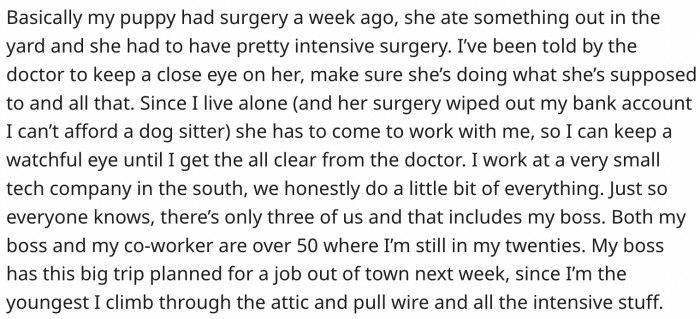
She has tough choices ahead. Reddit responds...
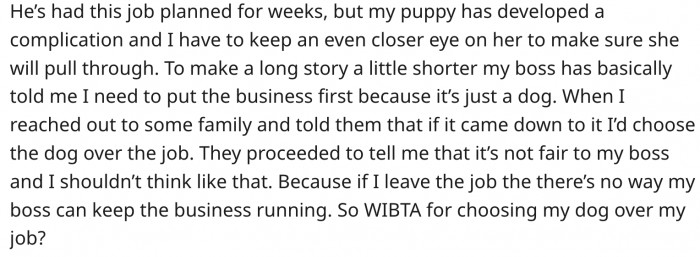
1. She has a right to choose her dog.

Balancing Work and Pet Care
Dr. Lisa Henderson, an occupational psychologist, emphasizes that balancing work responsibilities with pet care can be particularly challenging for many individuals.
Research shows that the stress associated with job demands often leads to feelings of guilt for pet owners, who may worry about their pet's well-being when they are away.
Understanding this balance is essential for maintaining both work performance and emotional well-being.
Balancing Work and Pet Care Responsibilities
Making the decision to prioritize pet care over employment can evoke strong emotions, particularly when pets are considered family members. Research shows that the bond between humans and their pets can lead to significant emotional distress when faced with difficult choices. This highlights the psychological principles underlying attachment theory, which emphasizes the profound connections we can form with our pets.
When individuals feel torn between their job and their pet's well-being, it often reflects deeper values around loyalty and responsibility.
2. She's not responsible for her boss's understaffed business.

3. She shouldn't care about her job because her boss doesn't care about her dog.
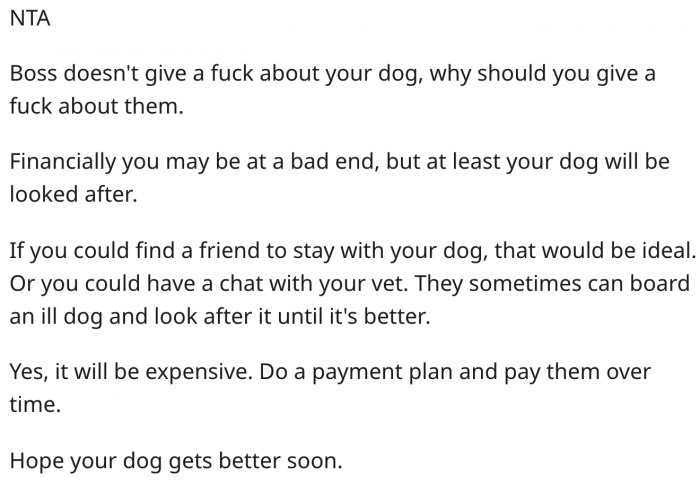
4. She needs a better solution as she can't care for a dog without income.

A clinical psychologist notes that the decision to quit a job for pet care may stem from a deep emotional bond with the animal.
Studies indicate that pets can provide significant emotional support, making it difficult for owners to separate from them during times of need.
However, it’s crucial to weigh the emotional benefits against the practical implications of such a decision.
From a psychological standpoint, the stress of balancing work and pet care can lead to feelings of guilt and anxiety. Studies indicate that individuals who experience high levels of stress in their professional lives often struggle with feelings of inadequacy in personal responsibilities, leading to emotional burnout. Understanding these dynamics is crucial for making informed decisions that honor both work commitments and the needs of the pet.
5. Her loyalty shouldn't be to her boss.

6. It is just a dog.

7. Her dog is more important than her job.

Strategies for Managing Work-Life Balance
Experts recommend exploring flexible work options, such as remote work or adjusted hours, to accommodate pet care needs.
These adjustments can help alleviate some of the guilt associated with leaving a pet alone for extended periods.
Additionally, creating a routine that includes quality time with the pet can enhance both well-being and productivity.
The Role of Emotional Attachments
Emotional attachments to pets can significantly influence decision-making processes. Research in behavioral psychology has shown that strong bonds with animals can lead to increased feelings of anxiety when faced with potential separation. This underscores the importance of considering the emotional implications of such decisions on both the individual and the pet.
Moreover, exploring the motivations behind the desire to prioritize pet care can help clarify underlying emotional needs, fostering a better understanding of personal values.
8. She should fulfill the agreement she made to the job.

9. The dog should be kenneled while she works.

10. She should contact her vet for an alternative solution.
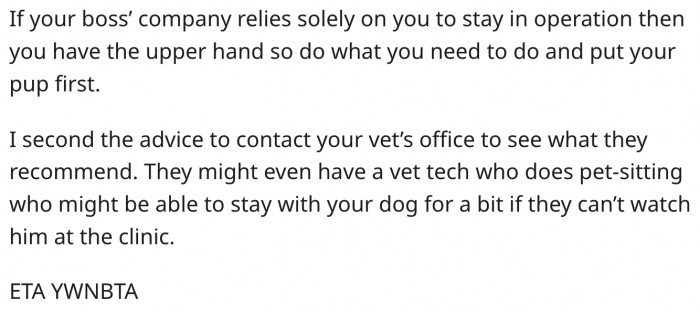
Social psychologists emphasize the importance of self-care in maintaining a healthy work-life balance.
Research indicates that prioritizing self-care can lead to improved emotional regulation and overall satisfaction in both personal and professional domains.
By taking time to engage with pets and manage stress, individuals can enhance their overall well-being.
Additionally, understanding the emotional ramifications of quitting a job for pet care is essential. Studies indicate that individuals often grapple with feelings of guilt and uncertainty when contemplating significant life changes. By acknowledging these emotions, one can navigate the decision-making process with greater clarity and confidence.
11. It's up to her to decide what's important to her.

12. She's about to make an irresponsible financial decision.
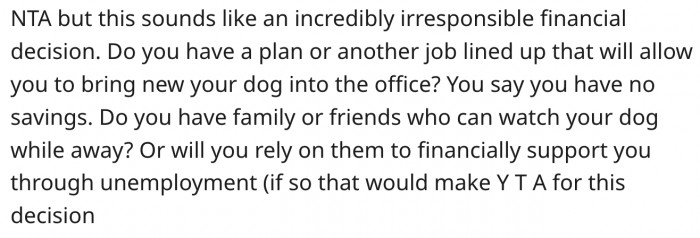
13. Your loved ones should come first because your employer can replace you at your job.

Practical Strategies for Balancing Commitments
Implementing a structured plan for pet care that accommodates work responsibilities can help alleviate stress. This might include hiring a pet sitter or exploring flexible work arrangements that allow for more time at home. Research supports the idea that creating a balance between work and personal life can enhance overall well-being and satisfaction.
Moreover, engaging in discussions with employers about work-life balance can lead to supportive arrangements that respect both professional and personal responsibilities.
14. She's free to do whatever she wants as long as she's financially independent.

15. She can't care for the dog without an income.

16. It is just a job.

Ultimately, navigating the complexities of work and pet care requires thoughtful consideration of emotional needs and practical realities. By fostering an environment that prioritizes both commitments, individuals can make decisions that honor their values while maintaining their emotional well-being.
17. If she's valuable to the job, her boss should make exceptions for her.
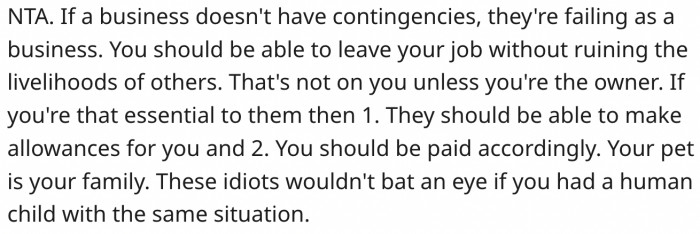
18. She should consider the financial implications since the surgery wiped out all her savings.
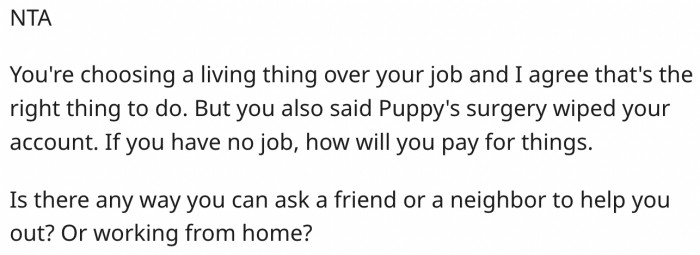
19. Dogs are just as important as humans.
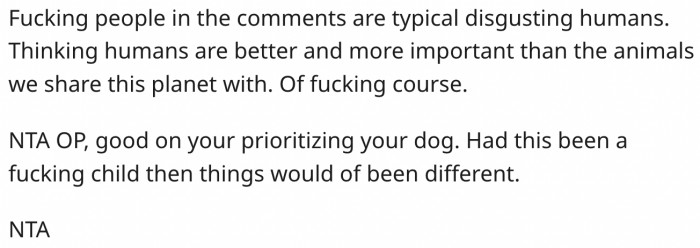
20. Her boss and family do not understand that pets are like children.
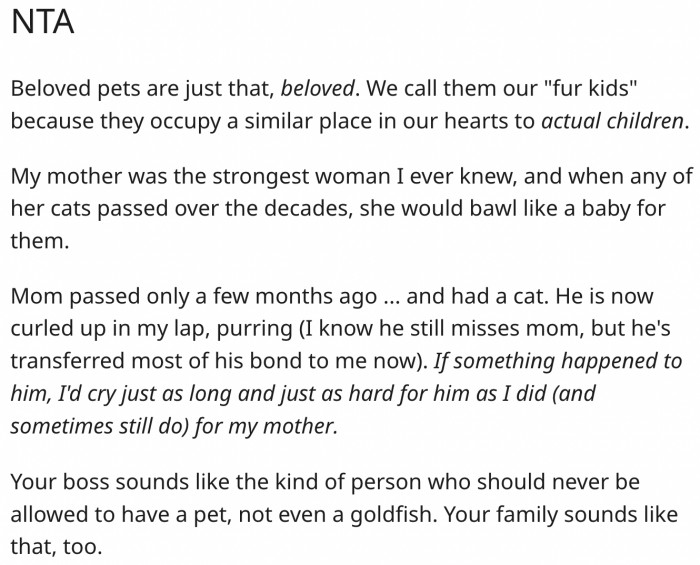
21. She could enlist her boss's or co-worker's help to watch the dog.
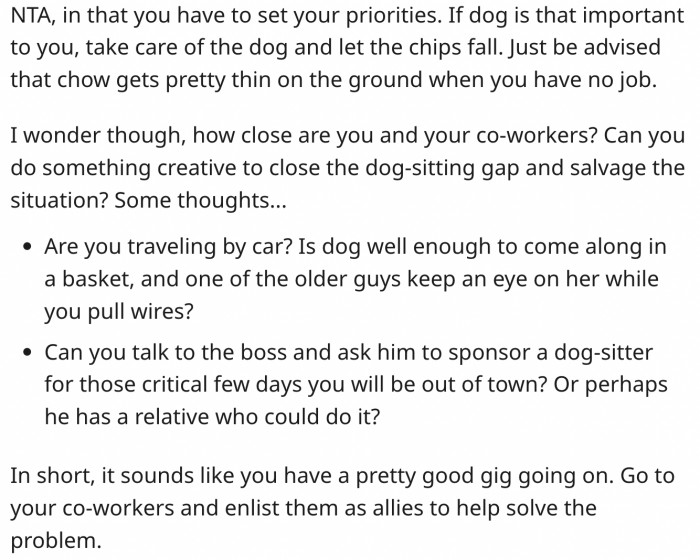
22. She should explore other options that don't involve quitting her job because she needs it to pay her bills.
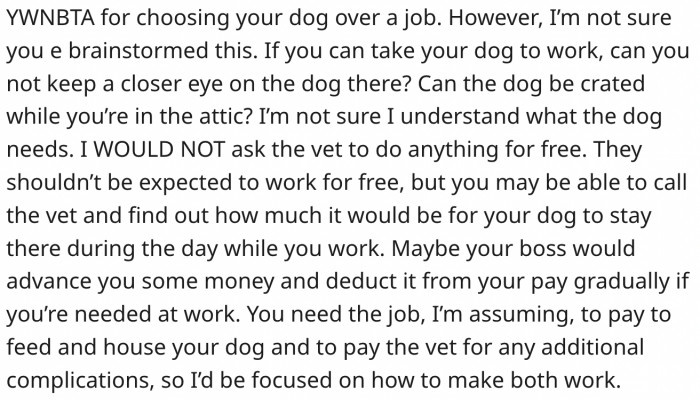
What Do You Think?
Would you advise Middle-Locksmith to quit her job to care for her dog? We wouldn't.
Not only because she needs it to pay bills, but also because there are other options she can explore that aren't extreme.
For instance, she can ask her boss for an advance to pay for a dog sitter. She could ask a friend to watch the dog while she is on the job trip.
If nothing works out, it's OP's choice to quit her job so she can care for her beloved pup. In either case, we want what's best for the little pup, and if that means saying goodbye to the job, so be it.
What do you think?
Psychological Analysis
This situation exemplifies the emotional challenges individuals face when balancing work and pet care. The strong bond between humans and their pets often leads to difficult decisions that reflect deeper values around responsibility and loyalty. Open communication and practical solutions are key to navigating these complexities effectively.
Analysis generated by AI
Analysis & Alternative Approaches
In summary, the decision to prioritize pet care over work responsibilities is filled with emotional complexities that require careful consideration. By fostering open communication and exploring practical solutions, individuals can navigate these challenges while honoring their commitments to both their pets and their professional lives.
Analysis & Alternative Approaches
Balancing work and pet care is a common challenge that requires careful consideration of emotional needs and practical responsibilities.
Dr. Lisa Feldman Barrett, an emotion researcher, emphasizes that "understanding our emotional responses is crucial in managing the stress of balancing work and personal life." For more insights, visit her professional website at lisafeldmanbarrett.com. By implementing strategies that prioritize self-care and communication, pet owners can navigate these complexities more effectively.



